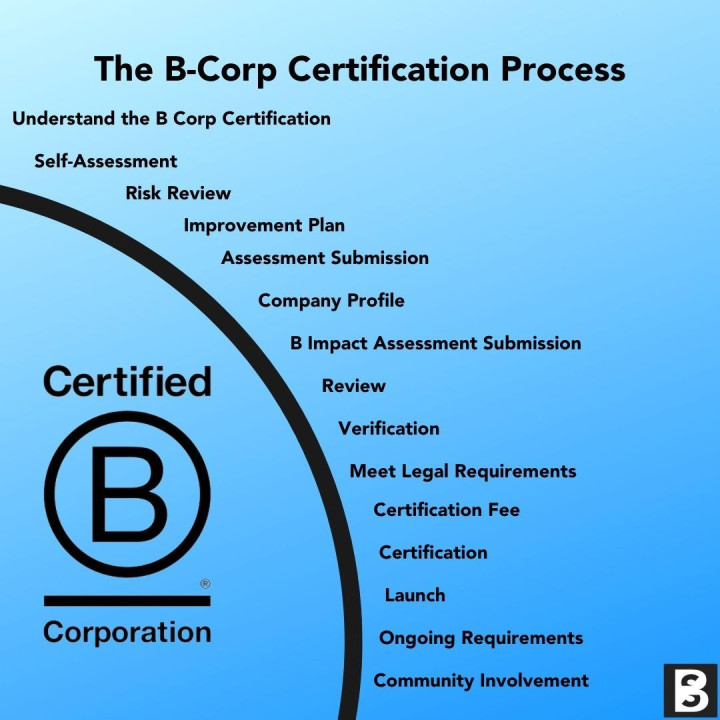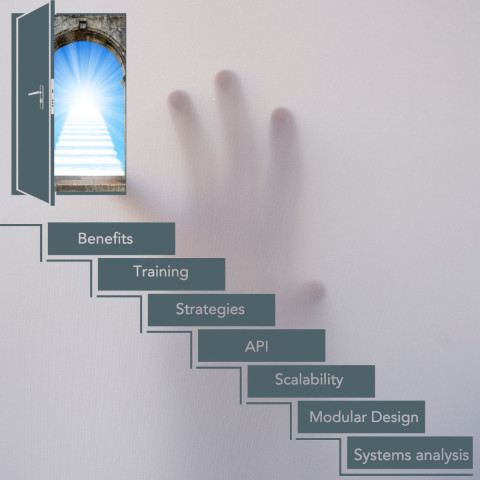Understanding B-Corp Certification: Benefits, Challenges, process & Criticism’s
In an era where corporate responsibility and sustainability are becoming crucial for businesses, B-Corp certification emerges as a hallmark of ethical and impactful business practices. Understanding B-Corp certification involves delving into its definition, recognising its benefits and challenges, navigating the certification process, and addressing criticisms. This certification, awarded by the non-profit organisation B Lab, signifies a company's commitment to social and environmental performance, accountability, and transparency. While offering numerous advantages such as enhanced reputation and operational improvements, it also presents challenges in terms of rigorous assessment and ongoing compliance. Additionally, exploring the critiques and concerns surrounding B-Corp certification provides a comprehensive view of this influential movement in the corporate world.
1. The Certified B-Corporation
Origins
The B-Corp movement was founded in 2006 by three friends—Jay Coen Gilbert, Bart Houlahan, and Andrew Kassoy. They created B Lab, a non-profit organisation aimed at redefining success in business by fostering companies that benefit all stakeholders, not just shareholders. Their vision was to create a global movement of people using business as a force for good.
Purpose
B Lab certification is a third-party standard that requires companies to meet rigorous social sustainability and environmental performance criteria, uphold accountability standards, and maintain transparency to the public based on their assessment scores. This certification applies to the entire company, encompassing all product lines and issue areas.
Mission Statement
Our global vision is of an inclusive, equitable, and regenerative economic system for all people and the planet. We are mobilising the B Corp movement to change our economic system to positively impact all stakeholders — workers, communities, customers, and our planet.
Global Expansion
Since its inception, the B-Corp movement has grown significantly. The first B-Corp certifications were awarded in the United States, but the movement quickly spread globally. The UK introduced B-Corp certification in 2015, and the number of certified B-Corps has been steadily increasing. As of now (May 2024), there are over 8,750 B-Corps worldwide across 100 countries and 162 industries, including over 2,000 in the UK with over 81,000 employees.
Criteria
A for-profit business of any size can qualify as a B Corp as long as it has been operating for a minimum of 12 months.
To complete the B Impact Assessment, you must provide data from the last 12 months. Therefore, you must wait until your business is one year old to attain full status.
Refer to the B Lab website for up to date information and support:
https://www.bcorporation.net/en-us/
Key Differences between Certified B-Corporations (B-Corp) and Benefit Corporations
Certification vs. Legal Status
B Corp certification is a voluntary certification process managed by B Lab, while benefit corporation status is a legal designation that a company adopts by amending its articles of incorporation.
Assessment and Verification
Certified B Corps undergo a rigorous assessment and verification process by B Lab. Benefit corporations, on the other hand, adhere to legal requirements and self-report their performance annually.
Jurisdiction
B Corp certification is available globally, whereas the benefit corporation legal status is specific to certain jurisdictions.
Governance
Benefit corporations have a legal obligation to pursue social and environmental goals, whereas Certified B Corps are committed to these goals through the certification process and B Lab’s standards.
Both Certified B Corporations and benefit corporations aim to redefine success in business by prioritising social and environmental performance alongside profit. However, they achieve this through different mechanisms – one through certification and the other through legal incorporation.
DID YOU KNOW
The US company, Untours, was the first to receive the B-Corp certification
https://www.untours.com/blog/h...
2. Benefits of B-Corp Certification
Enhanced Reputation
B-Corp certification signals to customers, employees, and investors that a company is committed to high standards of social and environmental responsibility. This can enhance the company’s reputation and differentiate it from competitors.
Attraction and Retention of Talent
Employees, especially younger generations, increasingly seek purpose-driven work. Being a B-Corp can help attract and retain top talent who are motivated by the company’s commitment to positive impact.
Increased Customer Loyalty
Consumers are becoming more conscious of the ethical and environmental practices of the companies they support. B-Corp certification can build customer trust and loyalty by demonstrating that the company prioritises positive impact over profit.
Access to a Supportive Network
B-Corps join a global community of like-minded businesses committed to using business as a force for good. This network offers opportunities for collaboration, learning, and support.
Long term resilience
As a company must recertify every three years it encourages continuous improvement, fostering long-term resiliency.
3. Challenges of B-Corp Certification
Rigorous and Time-Consuming Certification Process
The BIA is comprehensive and demanding, requiring significant time and resources. Companies must thoroughly document their practices and often need to make substantial changes to meet the certification standards. The process can take over a year.
Legal and operational changes
Amending the company’s legal governing documents to meet B-Corp requirements can be complex and may require legal consultation. Additionally, implementing and maintaining the necessary operational changes can disrupt existing processes and require significant investment.
Ongoing commitment and recertification
B-Corps must recertify every three years, ensuring they maintain high standards and continue to improve their social and environmental performance. This ongoing commitment can be challenging and resource-intensive.
Financial costs
Obtaining and maintaining B-Corp certification involves fees that can be substantial, especially for smaller companies. The certification fee is based on annual sales, and the costs of making necessary operational changes can also be high.
Potential for negative public perception
B-Corps are held to high standards of transparency and accountability, which subjects them to intense scrutiny, particularly by activists. Any perceived failure to meet B-Corp standards or any negative publicity can damage the company’s reputation. Additionally, companies may face accusations of greenwashing if stakeholders perceive that they are not genuinely committed to their B-Corp commitments.
4. The B Impact Assessment (BIA)
The cornerstone of the B-Corp certification process is the B Impact Assessment (BIA), which evaluates a company’s impact on its workers, customers, community, and environment. The BIA is comprehensive and covers five key areas:
- Governance: Examines the company’s transparency, accountability, and ethical practices.
- Workers: Assesses employee benefits, compensation, training, and work environment.
- Community: Evaluates the company’s engagement with and impact on its local community, including diversity and inclusion, job creation, and charitable giving.
- Environment: Looks at the company’s environmental practices, including resource conservation, waste management, and sustainability initiatives.
- Customers: Reviews the company’s customer stewardship and the impact of its products and services.
To achieve certification, a company must score at least 80 out of 200 points on the BIA. The assessment is rigorous and requires detailed documentation and evidence of the company’s practices.
Legal Requirement
In addition to completing the BIA, companies must amend their legal governing documents to require the board of directors to consider the impact of their decisions on all stakeholders, including employees, customers, suppliers, community, and the environment. This legal change ensures that the company’s commitment to social and environmental performance is embedded in its governance structure.
Verification and Certification
Once the BIA is completed and the legal requirements are met, the assessment is reviewed by B Lab’s Standards Advisory Council. This review process includes verification of the company’s claims and may involve additional documentation or interviews. If the company meets all criteria, it is awarded B-Corp certification, which is valid for three years.
DID YOU KNOW
Among the B Corps in the UK, almost half are based in London. A further 70 are based in Scotland, 31 in Wales and nine in Northern Ireland.
(bettersociety.net)
5. The B-Corp Certification Process
For all UK businesses, except sole traders, a Pending B-Corp Status can be applied for. There’s a one-time fee of £500 + VAT, which covers a 12-month period, whilst your application is in progress.
All B Lab current pricing can be found on their website:
https://bcorporation.uk/b-corp-certification/the-certification-process/pricing/
a. Understand the B Corp Certification
- Research: Learn about the B Corp certification, its benefits, and requirements. Visit the B Corporation website and review case studies.
- Commitment: Ensure your business is committed to high standards of social and environmental performance, accountability, and transparency.
b. Self-Assessment
- B Impact Assessment (BIA): Complete the free, confidential B Impact Assessment to measure your company’s impact on workers, community, environment, and customers.
- Score: Aim for a minimum score of 80 out of 200 points. The assessment helps identify strengths and areas for improvement.
c. Risk review
- Risk Review: Complete the Risk Review and if relevant, baseline requirements for multinational corporations.
d. Improvement Plan
- Review Results: Analyse your BIA results to understand areas where your business can improve.
- Implement Changes: Make necessary changes to your business practices to improve your BIA score. This may involve new policies, practices, and programs.
e. Assessment Submission
- Documentation: Gather documentation and data to support your BIA answers.
- Submit: Submit your completed BIA to B Lab for evaluation. B Lab is the nonprofit organisation that certifies B Corps.
- Note: You can save and return to your assessment at any time.
- Submission Fee: Currently the UK submission fee (May 2024) the fee is £250 +vat
f. Company profile
- Company Profile: When prompted, populate your Company Profile, do so once you have completed most of the Assessment.
- Disclosure Questionnaire: Begin the Disclosure Questionnaire. At this stage, you will learn your baseline score; if it falls below the 80-point benchmark, reassess, and prioritise areas for improvement.
g. B Impact Assessment submission
- Submission: Submit if you exceed the 80-point benchmark
h. Review
- Review: B Lab reviews your submitted BIA. This includes a comprehensive review of your company's practices and impact.
i. Verification
- Verification Queue: You will be asked to provide information about your employees and suppliers.
- Assessment Review: Engage in an Assessment Review with a B Lab Standards Analyst. This may involve phone calls, documentation review, and potentially an on-site visit.
- Note: from 1st July 2024 a verification fee will be implemented by B Lab.
j. Meet Legal Requirements
- Legal Changes: Amend your company’s governing documents to include B Corp legal requirements. This ensures accountability by requiring consideration of all stakeholders, not just shareholders, in decision-making.
- Filing: File the amended governing documents with the relevant authorities.
k. Certification Fee
- Fee: Pay the annual certification fee, which is based on your company's revenue. This fee supports the administration of the certification.
- In the UK there is a one-off fee of £500 + vat for Certification.
l. Certification
- Achieve Certification: Once B Lab verifies your score and legal requirements are met, your company will be certified as a B Corporation.
- Public Declaration: Announce your certification to stakeholders, customers, and the public.
- Publication: To fulfil the transparency requirement for B Corp Certification, you must publish your public profile in the B Corp Directory, which includes your company's score and impact report.
m. Launch
- Commemorate: Celebrate and share your B Corp status internally with employees, board members, and shareholders, as well as externally with suppliers, vendors, and the public.
n. Ongoing Requirements
- Annual Report: Complete and submit an annual B Impact Report to maintain transparency and accountability.
- Recertification: Every three years, your business must undergo recertification to ensure ongoing compliance with B Corp standards.
- Continuous Improvement: Continually work on improving your BIA score and implementing sustainable and ethical practices.
o. Community Involvement
- Engage: Participate in the B Corp community by attending events, sharing best practices, and collaborating with other B Corps.
- Advocacy: Advocate for the B Corp movement and encourage other businesses to pursue certification

6. B-Corp Certification Criticism’s
Legitimacy
"The sheer volume of different certification schemes means that consumers are becoming confused about which of these schemes is legitimate." (BBC.com/worklife)
Certification is based on self-reporting
Certification depends on self-reporting, which some critics of the B Corp designation consider to be unclear and problematic. Academics and ethical consumer action groups argue that this approach allows for distortion of internal reporting procedures or fabrication of findings.
Greenwashing
There are growing concerns about B Corp certification and greenwashing. Critics argue that some companies might leverage the B Corp status to appear environmentally friendly without making substantial changes to their practices. This can lead to greenwashing, where businesses highlight minor eco-friendly actions to distract from larger, more impactful issues.
For instance, a company might advertise its efforts to reduce single-use plastics while overlooking the urgent need to decarbonise its supply chain. This discrepancy can mislead consumers into believing they are supporting genuinely ethical brands, when in reality, these products may not meet their personal sustainability standards.
Brewdog
In 2021, BrewDog, a fully certified B Corp, was accused by former staff of having a "rotten culture," leading to the revocation of its B Corp status. In 2024, B Corp-certified bottled water brand Aqua topped the audit of Indonesia’s biggest plastic polluters.
Nepresso
In 2022, 30 Certified B Corps, along with certification watchdog Fair World Project, petitioned against Nespresso's B Corp certification, citing that only 28% of their aluminium capsules are recycled and its farmers, in its supply chain, receive poverty wages. B Lab’s decision to certify corporations with single-use products has led to accusations of greenwashing, as these companies are labelled as good corporate citizens despite their environmental impact. B-Corp has been described as "capitalism through certification," with calls for more fundamental reforms to prioritise shared prosperity, workplace democracy, and sustainability.
B-Corp certification represents a significant commitment to social and environmental responsibility, accountability, and transparency. While the certification offers numerous benefits, including enhanced reputation, customer loyalty, and access to a supportive network, it also presents challenges. The rigorous certification process, legal and operational changes, ongoing commitment, financial costs, and potential for negative public perception are all important factors that companies must consider.
Ultimately, becoming a B-Corp can be a powerful way for companies to demonstrate their commitment to positive impact and to join a global movement of businesses dedicated to using business as a force for good. However, it requires careful consideration and a willingness to invest the necessary time, resources, and effort to meet and maintain the high standards of certification.

Admin Overload: The Silent Business Killer
The cost of manual, repetitive admin tasks In countless small and medium-s...
3 min read

eCommerce Trends 2025
The e-commerce landscape has been evolving at a rapid pace over the past fe...
5 min read

Shopify alternatives A comprehensive guide 2025
In the realm of e-commerce, Shopify has been a dominant player for years, r...
6 min read

